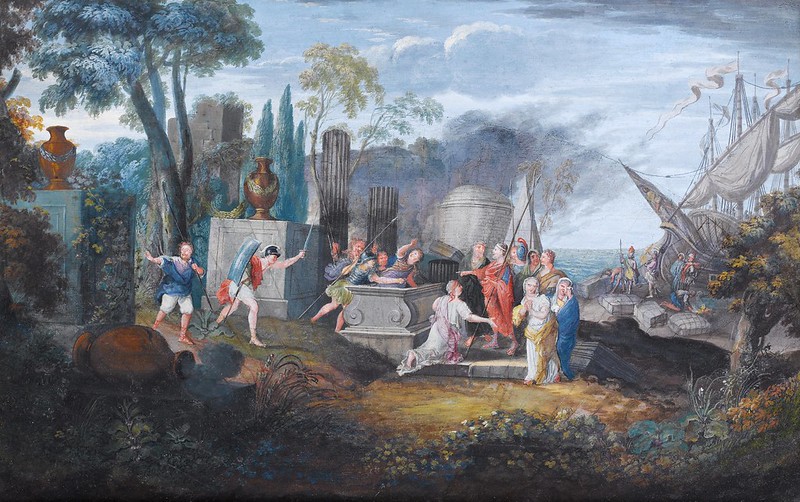Tommaso Traetta (1727-1779)
- Overtura 'Antigona' (1772)
Performers: Volаntеs Orchestra; Jаkubа Kydlíčkа (conductor)
Further info: Tommaso Traetta (1727-1779) - Stabat Mater Dolorosa
---
Italian composer. He was trained between 1740 and 1750 at the
Conservatorio di S Maria di Loreto, Naples, where his teachers were
Porpora (until 1741) and Durante. His Stabat Mater, probably written
around 1750, shows contrapuntal mastery and a penchant for sombre,
chromatic choral writing. In accordance with local custom, he presumably
proved his talents for the stage by writing comic operas for the
smaller Neapolitan theatres before receiving a commission to write Il
Farnace for S Carlo in 1751. He continued to write both serious and
comic opera throughout his life. In Rome and Naples during the early
1750s he came into contact with the commanding figure of Jommelli. In
1757-58 he had no fewer than five Metastasian operas performed in Rome
and northern Italian cities including Venice, which became his base. The
crucial phase of Traetta's career began with his appointment in 1758 to
the court at Parma, where the intendant Du Tillot proposed to unite
some features of French tragédie lyrique with the reigning ideals of
Italian aria opera, and to this end had the text of Rameau's Hippolyte
et Araicie translated and adapted by the court poet C.I. Frugoni. This
solidified his reputation as a reformer, leading to two other
significant works, Sofonisba for Mannheim in 1762 and Ifigenie for
Vienna the following year. In 1765 he was appointed as director of the
Conservatorio dell’Ospedale in Venice, which allowed him to be resident
in one of the most active opera-producing centers in Europe. His fame
brought him to the attention of Catherine II of Russia, who brought him
to St. Petersburg in 1768. There he composed one of his most advanced
and successful works, Antigona, in 1772. Traetta left Russia in
ill-health during the summer of 1775 and settled again in Venice. He
tried his fortunes for a time in London, among other places, with a
serious opera, Germondo. Burney related that the great English success
of Sacchini at the time prevented Traetta from becoming popular. In 1777
he was briefly in Paris, where he presumably sought new opportunities,
just as Mozart would the following year; Il cavaliere errante was given
posthumously at the Opéra in 1779. In autumn 1777 he returned to Venice,
where his son Filippo (also a composer) was born; his last two
completed works were comic operas for the Venetian carnivals of 1778 and
1779. By the latter date he was already suffering from his final
illness. He was a celebrated man at his death, and was buried with
honours near the Ospedaletto. Traetta’s music is characterized by a
depth of emotion and life given to his characters. He has a fluidity
with respect to melody, as well as using both ensembles and choruses
with good effect. Indeed, his music was regarded as “always beautiful
and sometimes sublime.” During his life he wrote 44 operas, as well as
an oratorio (Rex Salomon), two Masses, a Stabat mater, a St. John
Passion, a Miserere, and a number of smaller motets. He can be regarded
as one of the principal composers of Italian opera in the middle of the
18th century.

Cap comentari:
Publica un comentari a l'entrada